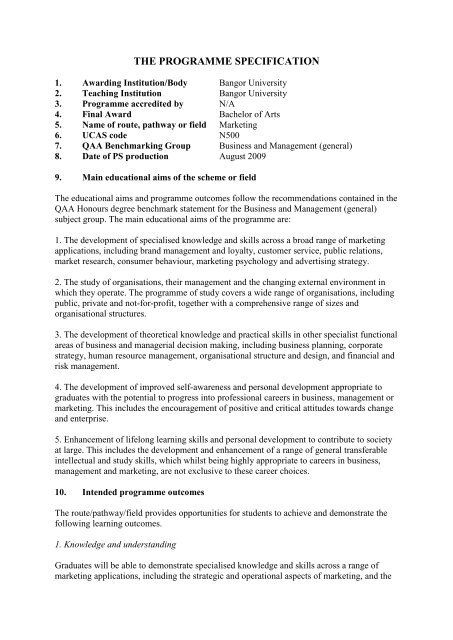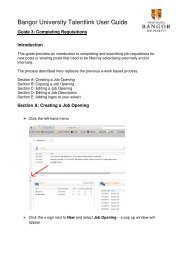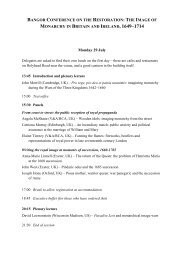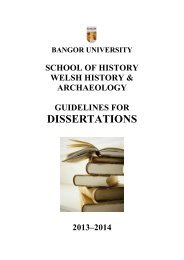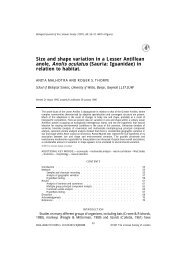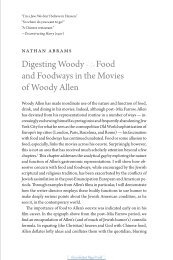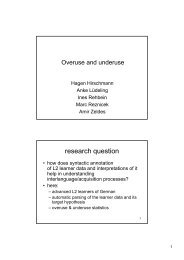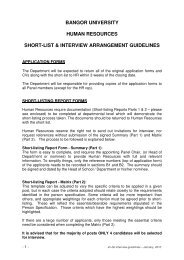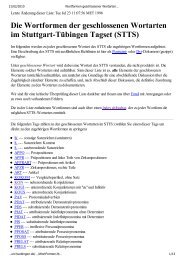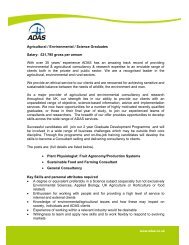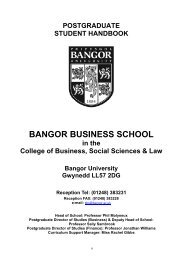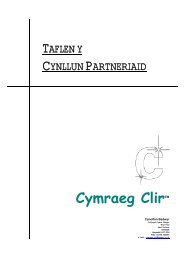Programme specification 2 - Bangor University
Programme specification 2 - Bangor University
Programme specification 2 - Bangor University
Create successful ePaper yourself
Turn your PDF publications into a flip-book with our unique Google optimized e-Paper software.
THE PROGRAMME SPECIFICATION<br />
1. Awarding Institution/Body <strong>Bangor</strong> <strong>University</strong><br />
2. Teaching Institution <strong>Bangor</strong> <strong>University</strong><br />
3. <strong>Programme</strong> accredited by N/A<br />
4. Final Award Bachelor of Arts<br />
5. Name of route, pathway or field Marketing<br />
6. UCAS code N500<br />
7. QAA Benchmarking Group Business and Management (general)<br />
8. Date of PS production August 2009<br />
9. Main educational aims of the scheme or field<br />
The educational aims and programme outcomes follow the recommendations contained in the<br />
QAA Honours degree benchmark statement for the Business and Management (general)<br />
subject group. The main educational aims of the programme are:<br />
1. The development of specialised knowledge and skills across a broad range of marketing<br />
applications, including brand management and loyalty, customer service, public relations,<br />
market research, consumer behaviour, marketing psychology and advertising strategy.<br />
2. The study of organisations, their management and the changing external environment in<br />
which they operate. The programme of study covers a wide range of organisations, including<br />
public, private and not-for-profit, together with a comprehensive range of sizes and<br />
organisational structures.<br />
3. The development of theoretical knowledge and practical skills in other specialist functional<br />
areas of business and managerial decision making, including business planning, corporate<br />
strategy, human resource management, organisational structure and design, and financial and<br />
risk management.<br />
4. The development of improved self-awareness and personal development appropriate to<br />
graduates with the potential to progress into professional careers in business, management or<br />
marketing. This includes the encouragement of positive and critical attitudes towards change<br />
and enterprise.<br />
5. Enhancement of lifelong learning skills and personal development to contribute to society<br />
at large. This includes the development and enhancement of a range of general transferable<br />
intellectual and study skills, which whilst being highly appropriate to careers in business,<br />
management and marketing, are not exclusive to these career choices.<br />
10. Intended programme outcomes<br />
The route/pathway/field provides opportunities for students to achieve and demonstrate the<br />
following learning outcomes.<br />
1. Knowledge and understanding<br />
Graduates will be able to demonstrate specialised knowledge and skills across a range of<br />
marketing applications, including the strategic and operational aspects of marketing, and the
study of the external marketing environment. Graduates will also develop a broad knowledge<br />
of business and management subjects.<br />
1.1. The study of the strategic and operational aspects of marketing encompasses the internal<br />
aspects of marketing, including: the formulation of marketing strategies; the management of<br />
the marketing function and its positioning relative to other key business functions; advertising<br />
and branding; customer relations management; applications of Communications and<br />
Information Technology; and e-marketing.<br />
1.2. The study of the external marketing environment encompasses consumer behaviour and<br />
marketing psychology, marketing communication, public relations and market research.<br />
1.3. The study of the broader range of business and management subjects provides an<br />
understanding of organisations, the external environment in which they operate, and how they<br />
are managed.<br />
2. Cognitive (thinking) skills<br />
Graduates will develop a range of cognitive and intellectual skills:<br />
2.1. Cognitive skills of critical thinking, analysis and synthesis. This includes the capability<br />
to identify assumptions, evaluate statements, to detect false logic and reasoning, to identify<br />
implicit values, to define terms adequately and generalise appropriately.<br />
2.2. Effective problem solving and decision making using appropriate qualitative and<br />
quantitative skills, including identifying, formulating and solving business problems. The<br />
ability to create, evaluate and assess a range of options, and apply ideas and knowledge to a<br />
range of situations.<br />
2.3. Numeracy and quantitative skills, including data analysis, interpretation and<br />
extrapolation, and a critical awareness of the uses and limitations of models of business<br />
problems and phenomena.<br />
3. Key skills<br />
Graduates will develop a range of key skills:<br />
3.1. Effective oral and written communication, across a range of media widely used in<br />
business.<br />
3.2. Effective use of Communication and Information Technology (CIT) for accounting and<br />
finance and general business applications.<br />
3.3. Effective self-management in terms of time, planning and behaviour, motivation, selfstarting,<br />
individual initiative and enterprise.<br />
3.4. Learning to learn and developing an appetite for learning; reflective, adaptive and<br />
collaborative learning.
3.5. Self-awareness, openness and sensitivity to diversity in terms of peoples, cultures and<br />
organisations.<br />
3.6. Effective team working and interpersonal skills: leadership, team-building, influencing,<br />
project management skills, listening, negotiating, persuasion and presentation.<br />
3.7. Research skills: familiarity with data, sources of information and research<br />
methodologies.<br />
4. Subject specific skills<br />
Within the framework of the three main areas identified in part 1 (above), graduates<br />
will be able to demonstrate subject-specific knowledge and understanding in the<br />
following areas:<br />
4.1. Marketing strategy and management.<br />
4.2. Advertising strategy.<br />
4.3. Consumer behaviour and marketing psychology.<br />
4.4. Information Systems, Communication and Information Technology and emarketing.<br />
4.5. Organisations, the environment in which they operate, and their management.<br />
4.6. Contemporary and pervasive issues.<br />
Teaching and learning strategies and methods<br />
Students will be given the opportunities shown below to acquire knowledge and<br />
understanding, cognitive, key and subject-specific skills.<br />
<strong>Programme</strong> outcomes<br />
1.1 1.2 1.3 2.1 2.2 2.3 3.1 3.2 3.3 3.4 3.5 3.6 3.7 4.1 4.2 4.3 4.4 4.5 4.6<br />
Lectures x x x x x x x x x x x x x x<br />
Seminars x x x x x x x x x x x x x x<br />
Individual<br />
study<br />
x x x x x x x x x x x x x x x x x<br />
Group work x x x x x x x x x x x x x x x x x x x<br />
Visiting<br />
speakers<br />
x x x x x x x x x x x x x<br />
Assessment<br />
The main methods for assessing whether learning outcomes have been achieved are shown<br />
below.<br />
<strong>Programme</strong> outcomes<br />
1.1 1.2 1.3 2.1 2.2 2.3 3.1 3.2 3.3 3.4 3.5 3.6 3.7 4.1 4.2 4.3 4.4 4.5 4.6<br />
Examinations x x x x x x x x x x x x x x x<br />
Class tests x x x x x x x x x x x x x x x x<br />
Essays x x x x x x x x x x x x x x x
Group<br />
assignments<br />
x x x x x x x x x x x x x x x x x x x<br />
Presentations x x x x x x x x x x x x x x x x x x x<br />
11. Route/pathway/field requirements, levels, modules, credits and awards<br />
The programme is offered in full-time and part-time mode.
BA MARKETING<br />
Year 1 Semester Credits<br />
ASB-1103 * Introduction to Business and Management 1 10<br />
ASB-1200 Learning Skills 1 10<br />
ASB-1110 Financial and Management Accounting 1+2 20<br />
ASB-1112 * Introduction to Economics 1+2 20<br />
ASB-1101 Quantitative Methods 1+2 20<br />
ASB-1104 * Introduction to Marketing 2 10<br />
ASB-1202 Introduction to Banking and Finance 2 10<br />
ASB-1208<br />
+ Options (20 credits)<br />
Chinese Business and Language<br />
or<br />
1+2 20<br />
SXL-1114<br />
Year 2<br />
Law for Non-Lawyers<br />
or<br />
Any Year 1 module throughout the university onto which<br />
the school concerned will accept you<br />
1+2 20<br />
ASB-2103 * Principles of Marketing 1 10<br />
ASB-2104 * Principles of Organisation and Management 1 10<br />
ASB-2108 Quantitative Methods 1 1 10<br />
ASB-2113 Marketing Communication 1 10<br />
ASB-2411 Research Methods 1 10<br />
ASB-2107 Consumer Behaviour 2 10<br />
ASB-2109 Marketing Research 2 10<br />
ASB-2112 Business Information Systems 2 10<br />
ASB-2410 *<br />
SXL-2121<br />
SXL-2114<br />
+ Options (40 credits)<br />
Any BBS Year 2 modules (subject to pre-requisites)<br />
except ASB-2110<br />
including<br />
Dissertation Proposal (pre-requisite for Dissertation in Year<br />
3) or<br />
Company Law (if you have already taken SXL-1114) or<br />
Law for Non-Lawyers (if you have not already taken SXL-<br />
1114)<br />
or<br />
ELCOS modules (international students only)<br />
2<br />
1+2<br />
1+2<br />
Year 3<br />
ASB-3101 * Human Resource Management 1 10<br />
ASB-3102 International Business 1 10<br />
ASB-3103 Marketing Strategy and Management 1 10<br />
ASB-3112 Advertising Strategy 1 10<br />
ASB-3114 e-Marketing 1 10<br />
ASB-3107 Marketing of Services 2 10<br />
ASB-3108 Group Marketing Project 2 10<br />
ASB-3109 * Strategic Management 2 10<br />
ASB-3113 Marketing Psychology 2 10<br />
ASB-3412 *<br />
+ Options (30 credits)<br />
Any BBS Year 3 modules (subject to pre-requisites)<br />
except ASB-3111, ASB-3303<br />
including<br />
Dissertation<br />
*<br />
Welsh language version available.<br />
1+2<br />
10<br />
20<br />
20<br />
20 max<br />
20
Award requirements<br />
For the Honours degree in Marketing:<br />
� Achieve a total of 360 credits.<br />
� Satisfy <strong>University</strong> progression rules at levels 1 and 2.<br />
For the Diploma in Higher Education (Dip HE):<br />
� Achieve a total of 240 credits.<br />
� Satisfy <strong>University</strong> progression rules at level 1.<br />
For the Certificate in Higher Education (Cert HE):<br />
� Achieve a total of 120 credits.<br />
12. Criteria for admission<br />
A-level 240-280 points, plus GCSE Mathematics at Grade C (or equivalent)<br />
Alternatives to A-level include:<br />
BTEC HND with 3 merits and 2 distinctions<br />
GNVQ (Advanced) overall Merit award<br />
Scottish Highers BBBC<br />
Irish Highers: 5 Highers including English (380 points)<br />
International Baccalaureate with 28 points<br />
Equivalent overseas qualifications<br />
International students whose first language is other than English must also satisfy:<br />
IELTS 6.0 or TOEFL equivalent<br />
Notes:<br />
Mature students are considered on individual merit<br />
Applicants with relevant prior qualifications may be eligible for direct entry to Year 2<br />
13. Student employability and careers<br />
Graduates from this programme are expected to obtain employment in a variety of careers in<br />
consumer, business-to-business and non-profit marketing. As data handling, marketing<br />
communications and marketing management activities expand, marketing graduates are<br />
expected to remain in high demand from employers. Some graduates from this programme are<br />
expected to pursue careers in other business and management-related functions.


